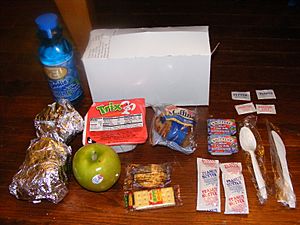Military terminology facts for kids
Military terminology is the special language used by people in the military. It includes unique words and acronyms (short forms of words). Sometimes, a military term might sound like a regular word but have a completely different meaning. Also, military terms can be different between countries, even if they both speak English. For example, British and American military terms for the same thing can be very different. These special words can also be specific to one part of the military, like the navy or army, or to a certain war or time period.
Contents
Why Military Language is Unique
Military language can be quite different from everyday talk. This section explains some of the reasons why military people use their own special words and phrases.
Hidden Meanings: Doublespeak
Sometimes, military terms are used to make things sound less harsh or to hide the real meaning. This is called "doublespeak." For example, when the United States military reduced the number of troops in Afghanistan, they called it "the retrograde." This is an old military word that means to retreat. Militaries often prefer not to say they are retreating.
Some military phrases can be very confusing to outsiders. For instance, "15 minutes prior to 15 minutes prior" is a common saying. It means that military members are expected to show up 15 minutes early for everything. So, if a meeting is set for "06:00" (6:00 a.m. on the 24-hour clock), you should actually be there by 05:45. This can lead to soldiers arriving much earlier than the official time.
Short and Sweet: Acronyms
Military people love using acronyms, which are abbreviations formed from the first letters of other words. It can sound like they are speaking in code! For example, a soldier might say, "I was on the FOB when the IDF hit, so I radioed the TOC." This means: "I was on the Forward Operating Base when the Indirect Fire hit, so I radioed the Tactical Operations Center."
There are so many acronyms that new recruits, military families, and even experienced soldiers are expected to learn most of them. They help military members communicate quickly and efficiently, especially in fast-paced situations.
Spelling It Out: The Phonic Alphabet
When people need to say letters clearly, especially over the radio or phone, they use a special "phonic alphabet." This helps avoid confusion between letters that sound similar, like "B" and "P." On ships, the navy used to use flags to represent different letters of the alphabet.
The NATO phonetic alphabet is widely used by militaries around the world. Here are some examples:
This alphabet is often used in military phrases. For example, Bravo Zulu means "well done" or "good job." This phrase came from naval signal manuals, where "BZ" had the same meaning. However, if someone just said "B Z" out loud, most people wouldn't understand.
Common Military Terms and Their Meanings
Many words have different meanings in the military compared to how civilians use them. Here are some examples of terms that people often misunderstand:
- Soldier – This term specifically refers to a member of the army. It does not include marines (who are called marines), navy personnel (called sailors or seamen), or air force personnel (called airmen).
- Commander – This can be a rank for a naval officer, or it can mean the person in charge of a military unit. However, the highest-ranking officers in each branch of the military, or the Chairman of the Joint Chiefs of Staff, are not called "commanders."
- Gun – In military talk, a rifle is usually not called a "gun." A pistol is a gun, and a machine gun is a gun. This can be confusing because in everyday language, a rifle is definitely a gun! Movies and television often get this wrong. An exception is the 21-gun salute. Historically, when a ship entered port, it would fire all its cannons (which were called "guns" in the navy) to show they were empty and the ship was friendly.
- Bazooka – A bazooka was a specific type of shoulder-fired anti-tank rocket launcher used during World War II and up to the Vietnam War. Modern portable rocket launchers are not called bazookas, even though people sometimes use the name generally.
- Hummer – A Hummer is a civilian car. It should not be confused with the Humvee or HMMWV, which stands for "High Mobility Multipurpose Wheeled Vehicle." A soldier or marine would never call a Humvee a Hummer, or vice versa.


